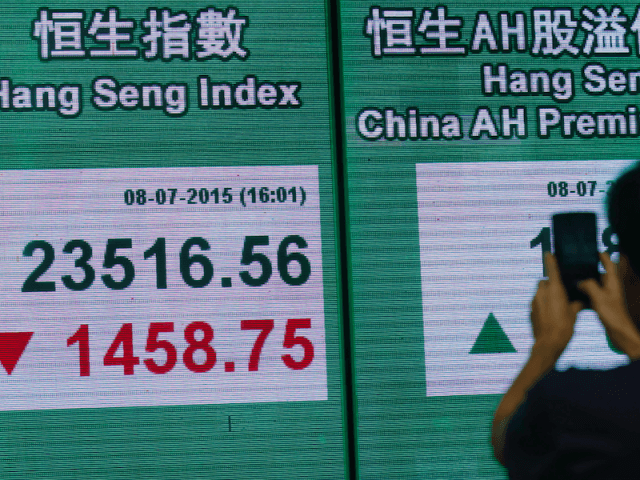Despite suspending trading in over 1300 of the 2800 stocks listed in China, the “Shanghai Stock Exchange B Share Index” of growth stocks suffered another 7 percent loss Wednesday and the neighboring Hong Kong ‘S&P Growth Enterprise Market Index’ plunged by 12 percent. With Chinese stock losses now over $3.5 trillion since June 12, contagious fear is sending every major stock exchange around the world tumbling.
The relentless selloff in Chinese markets sent Asian stocks to 18-month lows on Wednesday, with the MSCI’s broadest index of Asia-Pacific shares down 2.7 percent. Losses in excess of 5 percent were seen in China, Hong Kong and Taiwan, while the Japanese Nikkei was down 3.2 percent to a seven-week low.
Wednesday’s Chinese losses followed the “Black Tuesday” stock crash that saw the Shanghai B Share Index suffer a 9.1 percent loss, while the Shenzhen Exchange plunged 5.8%. The spectacular losses came despite the Communist Party leadership organizing a $200 billion government-financed stock “buying group” composed of 115 state-owned financial institutions.
As Breitbart News reported, Communist Party leaders President Xi Jinping and Premier Li Keqiang shaped the nation’s “Silk Road” reforms around a late 2013 pledge to let market forces play a “decisive role” in the economy by having equity markets provide a bigger share of corporate financing. As Bloomberg News noted: “State media cheerleading for the stock market played to patriotic sentiment, arguing that the rally was an endorsement of (President) Xi’s economic policies.” But with stock prices crashing and social media full of viral panic, Xi and Li’s credibility is at risk, and their failure to stop the crash could result in the Communist Party overthrowing the leadership as scapegoats.
That may be why the People’s Bank of China announced that it took urgent measures to provide sufficient liquidity to stabilize the stock market by “injecting unlimited liquidity into the China Securities Finance Co Ltd” (CSF).
The action means that the government will provide unlimited margin financing to state-owned banks and brokerage firms “through multiple channels to stabilize the stock market, and to keep from systematic and regional financial crisis.” The financing will be made available for inter-bank lending, financial bonds, mortgage and refinancing.
It is virtually unheard of in China for the People’s Bank of China to mention a crisis. But having suspended trading in 45 percent of the nation’s listed companies, it is clear that stock market losses would be much worse if companies began trading again.
The country’s securities watchdog, the China Securities Regulatory Commission, announced on Wednesday that the CSF will increase purchases of stocks with small and medium-sized market value, while continually buying the larger capitalization blue-chips.
Shortly thereafter, the commission announced that with the central bank’s help, the CSF is extending a 260 billion yuan ($42 billion) credit line to 21 securities firms to buy stocks.
According to Deng Ge, spokesman for the CSRC, the new government measures will increase market liquidity that is being hurt by “market panic and irrational selling.”

COMMENTS
Please let us know if you're having issues with commenting.